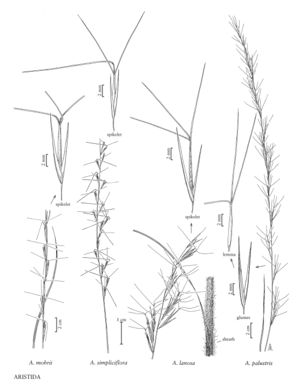Aristida palustris
Plants perennial; cespitose, bases hard, knotty. Culms 90-150 cm, often thickened basally, stiffly erect, usually unbranched; internodes hollow. Leaves cauline; sheaths usually shorter than the internodes, glabrous, remaining intact at maturity; collars glabrous; ligules to 0.1 mm; blades (8)10-30(35) cm long, 2-4 mm wide, usually flat, occasionally loosely involute, lax, glabrous, light yellow-green to bluish-green when young, drying brownish. Inflorescences paniculate, 25-45(55) cm long, 3-6 cm wide; nodes glabrous; primary branches 2-8 cm, usually single or paired, appressed to erect, occasionally ascending, without axillary pulvini, with (1)2-12 spikelets. Spikelets overlapping, appressed. Glumes (7.5)9-13.5 mm, subequal, stiff, glabrous or scabridulous, light brown or greenish-brown; lower glumes prominently 2-veined, 2-keeled by the development of 1 lateral vein, shortly (1-2 mm) awn-tipped; upper glumes 1-veined, shortly (0.5-1 mm) awn-tipped; calluses 1-1.4 mm; lemmas 6-9 mm, glabrous, 0.3-0.5 mm wide distally, light tan to brown, junction with the awns not evident; awns not disarticulating at maturity; central awns 15-40 mm, usually strongly curved basally, strongly divergent to horizontal distally; lateral awns 8-35 mm, at least 1/2 as long as the central awns, erect to strongly divergent; anthers 3, about 3 mm, purplish. Caryopses 4.4-5 mm, chestnut brown. 2n = unknown.
Distribution
Tex., La., Ala., Ga., Miss., Ky., Fla., N.C., S.C., Va.
Discussion
Aristida palustris is endemic to the southeastern United States, where it grows in seepage bogs, pitcher plant savannahs, wet pine flatwoods, bald-cypress depressions, and wet prairies. It is a distinctive species of the southeastern coastal plain region that differs from A. lanosa in several reproductive, vegetative, and habitat characteristics.
Selected References
None.
